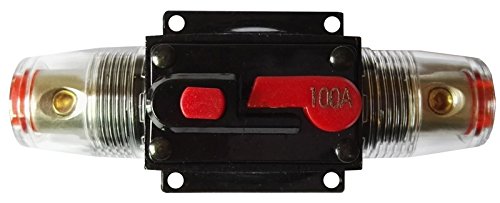I have a similar circuit breaker, but a 30 amp one, inbetween my solar controller and battery.
I can measure voltage drop across it, and it gets noticeably warmer than surrounding area when solar is making 7+ amps.
I thouroughly despise it.
I have another cheapo circuit breaker, Absolut brand, rated at 140 amps on my alternator feed.
After a few minutes of 65 to 90 amps it tripped at ~110 amps and I was lucky to not blow the diodes in my alternator as I only have one battery.
Don't cheap out on fuses or circuit breakers. Go for Bussman brand
As far as offgassing when driving, well that is dependent on the voltage the vehicle allows and how much voltage drip is on your circuit. That circuit breaker is resistance and will cause some voltage drop, perhaps much more than it really should, like my cheapo circuitbreaker does.
Not much gassing will occur once the vehicles voltage regulator says 13.6v is all you need, also charging amps are about 1/3 at 13.6 compared to if the voltage regulator were seeking 14.7v.
Be aware that the alternator, when cold and spinning fast has the potential to make a LOT of amperage, but if it is only allowed to make enough juice to seek and hold 13.6v by the voltage regulator,m which controls the output of the alternator, that potential is severly limited.
And 80% charged to 100% charged pretty much cannot be accomplished in under 3 hours, and those 3 hours are at ideal voltages, which your vehicle will not allow for those 3 hours.
So I would not get a pricey battery until you have a way of actually fully charging it regularly. Like by plugging in and using a battery charger, or using solar.
A voltmeter on your dashboard whose voltage sense lines are on house battery terminals will go a long way at showing you how fast the battery is being charged, but an Ammeter and a voltmeter would be much much better. How many amps flow into ad epleted battery at a certain voltage can reveal a lot.
If the battery accepts a lot of amps, it is not fully charged When a flooded 100AH battery acepts only ~1 amp at 14.5v, it is very close to fully charged, but taking 10 amps at 14 volts, means that battery is somewhere around 85% charged and that last 15% isgoing to take about 3 hours at 14 volts, on a healthy battery, Unhealthy batteries take even longer to fully charge.
I have this Ammeter display on my dashboard showing amps into or out of my battery.
https://www.amazon.com/bayite-Digit...75&sr=1-9-spons&keywords=bayite+ammeter&psc=1
Just slide the ring shaped hall effect sensor over a single fat wire.











